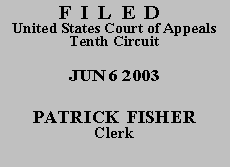

| PATRICIA DALTON,
Plaintiff-Appellant, v. STATE FARM FIRE AND CASUALTY COMPANY, a subsidiary of State Farm Mutual Automobile Insurance Company, a mutually held insurer, doing business in the State of Colorado with national headquarters in Bloomington, Illinois, Defendant-Appellee. |
|
Patricia Dalton, proceeding pro se, appeals the district court's grant of summary judgment to defendant on Ms. Dalton's claims in connection with the non-renewal of her business insurance policy in 1996. Her complaint asserted that the non-renewal was contrary to law, in bad faith, and a violation of a 1993 settlement agreement. On appeal, Ms. Dalton raises eight issues, many challenging discretionary decisions by the district court and the magistrate judge. We have jurisdiction over this appeal by virtue of 28 U.S.C. § 1291. Although we review the grant of summary judgment de novo, see Simms v. Okla. ex rel. Dep't of Mental Health & Substance Abuse Servs., 165 F.3d 1321, 1326 (10th Cir. 1999), our review of the court's discretionary decisions is only for an abuse of that discretion, see, e.g., Hendry v. Schneider, 116 F.3d 446, 449 (10th Cir. 1997) (applying abuse of discretion standard to determination of "good cause" for failure to timely serve defendant).
The first issue is a challenge to defendant's removal of Ms. Dalton's complaint from state court to federal district court on diversity jurisdiction grounds. Ms. Dalton contends that defendant is not diverse, and cites 28 U.S.C. § 1332(c)(1) as the legal authority supporting her argument that removal in this case was allowed in error. It is readily apparent that the cited provision does not apply here, because this is not a third-party cause of action arising under Ms. Dalton's policy.(1) Ms. Dalton cites no other authority for her arguments.
Ms. Dalton contends that the district court misapplied the law to her case in two respects: it did not comply with the Americans with Disabilities Act (ADA) and it did not properly consider her pro se status. She specifically mentions the court's denial of her motion for an extension of time to respond to defendant's summary judgment motion, its denial of her motion to amend her complaint, and the court's holding of the costs hearing "on the dot." Aplt. Br. at 2. Even if the court had some obligation under the ADA to take a party's disability into account in issuing rulings, we agree with defendant that Ms. Dalton has not shown that her asserted illness and its alleged attendant limitations qualify her as disabled under the ADA. Further, our careful review of the entire record in this case leads us to conclude that the more lenient standards applicable to pro se litigants were properly applied throughout the case and specifically in connection with the rulings mentioned. See Hall v. Bellmon, 935 F.2d 1106, 1110 (10th Cir. 1991) (liberally construing pro se plaintiff's pleadings, but declining "to assume the role of advocate").
Ms. Dalton challenges the district court's summary judgment ruling as error, alleging that examination of documents would have shown misrepresentations in defendant's motion. She contends that the district court ignored applicable law and avers that defendant could not demonstrate the factual basis for its stated reason for non-renewal. Ms. Dalton did not timely respond to the motion for summary judgment despite being given an extension of time, and her subsequent motion for an extension of time was denied for failure to demonstrate just cause. The court, however, did not rely on Ms. Dalton's failure to timely respond as a basis for granting the motion; it applied the undisputed facts to the applicable law as to each of Ms. Dalton's three claims and concluded, as a matter of law, that judgment was warranted in defendant's favor. Our review of the record convinces us that the district court properly granted summary judgment in this case.
Finally, Ms. Dalton challenges the following discretionary rulings: 1) the award of costs to defendant; 2) the denial of her motion to amend her complaint; 3) the denial of her motion to join an additional defendant; 4) the denial of her motion in limine; and 5) unspecified discovery rulings. Ms. Dalton presents numerous equitable arguments and conclusory legal assertions with respect to these rulings, but has demonstrated no basis on which we could conclude that the court abused its discretion. Our review of the record in this case leads us to conclude that the district court did not abuse its discretion in any of these rulings. The judgment of the United States District Court for the District of Colorado is AFFIRMED. Defendant's motion to dismiss is DENIED. Ms. Dalton's motion to accept her table of contents and legal authorities is GRANTED. We have considered Ms. Dalton's motion to strike out of time; the motion to strike is DENIED. Appellant's motion to proceed in forma pauperis is GRANTED.
Entered for the Court
Circuit Judge
*. This order and judgment is not binding precedent, except under the doctrines of law of the case, res judicata, and collateral estoppel. The court generally disfavors the citation of orders and judgments; nevertheless, an order and judgment may be cited under the terms and conditions of 10th Cir. R. 36.3.
1. Section 1332(c)(1) states, in pertinent part:
[A] corporation shall be deemed to be a citizen of any State by which it has been incorporated . . . except that in any direct action against the insurer of a policy or contract of liability insurance . . . to which action the insured is not joined as a party-defendant, such insurer shall be deemed a citizen of the State of which the insured is a citizen, as well as of any State by which the insurer has been incorporated . . . .